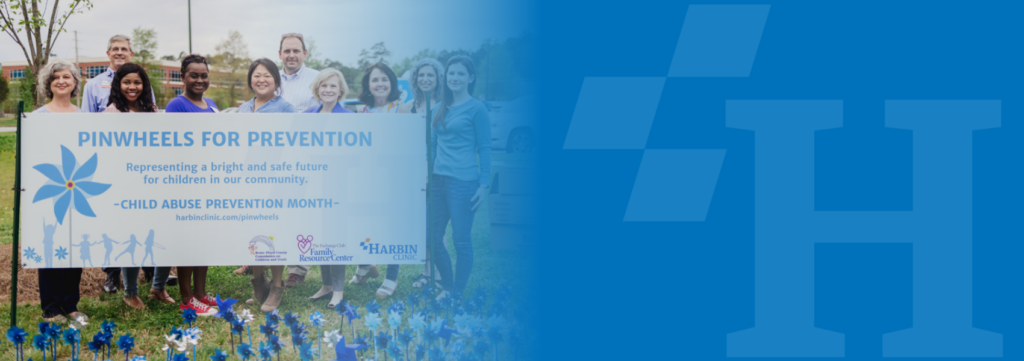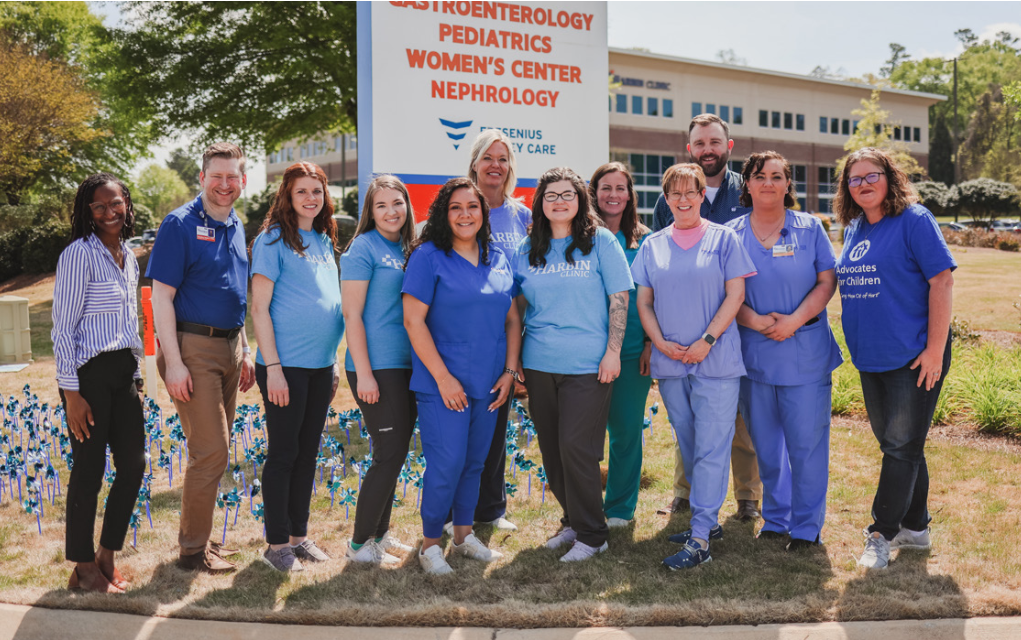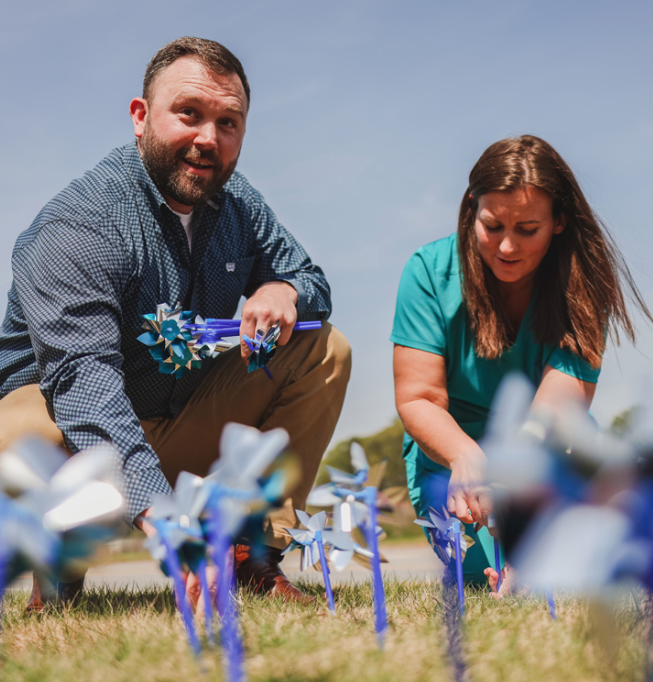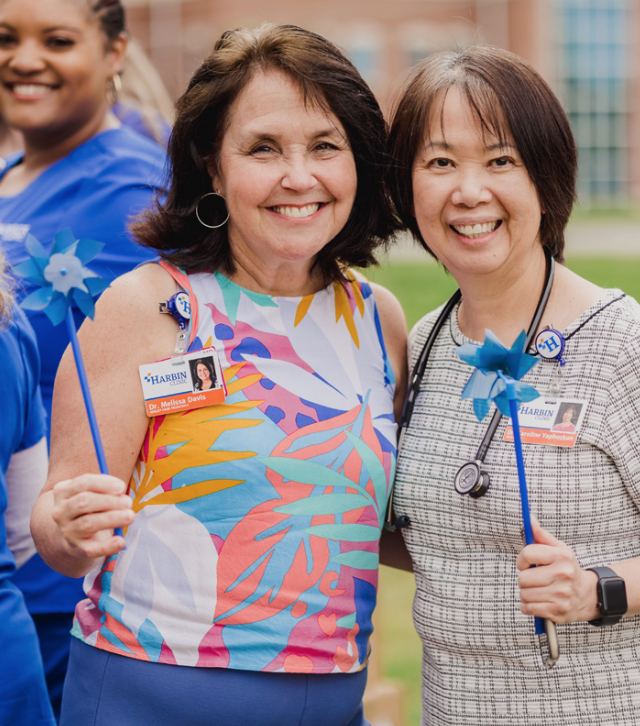April is Child Abuse Prevention Month

Harbin Clinic and Atrium Health Floyd are partnering with The Exchange Club Family Resource Center and Advocates for Children to raise awareness and provide encouragement, education and practical help for our children and families.
Symbols of a hopeful future
During April, a hosts of spinning blue pinwheels are planted in the grass near several Harbin Clinic locations. These pinwheels are eye-catching reminders that there is hope for the children of at-risk families.
The Family Resource Center works with parents who feel overwhelmed. Executive Director Tina Bartleson said, “Maybe they have a colicky baby, or maybe they’re not confident about how to raise their children in supportive, healthy ways. We go into homes and work with families every week for one to two hours per week for up to a year. We’re bringing in information about child development, parenting, life skills, budgeting—anything they need to deal with whatever challenges they’re facing.”
“What we find,” Bartleson said, “is some parents don’t have access to good information. Or they have trouble deciphering what is good information and what is misinformation. There are so many things coming at them—and when coupled with the everyday parenting pressure, it can be overwhelming. So, we walk with them as they try to implement positive changes in their lives.” She continued explaining that their whole system is based on trust and relationships. Although some parents are hesitant to get involved at first, they often later say, “Please don’t go!”
Pinwheels for Prevention
Another of Harbin Clinic’s partners in helping children and families is Advocates for Children, which works in 11 counties in Northwest Georgia. Amanda Tant, vice president at Advocates, says, “We have
eight distinct programs, all designed to prevent child abuse and build family capacity.”

Pinwheels for Prevention began in 2008 with Prevent Child Abuse America. “Now you’ll see the pinwheels at the Bartow County Courthouse and pediatric locations,” Tant says. “This is to bring awareness to the needs of the families and children we serve. These pinwheels represent the positive changes we can make in the lives of at-risk children when we come together to ensure they
have a brighter and safer future.”
Phoebe Floyd, marketing and communications manager at Advocates, explains, “One of our programs is Hope in Your Home, which is a parent education program. One of the programs within Hope in Your Home is First Steps. Last year, First Steps visited over six hundred babies in the hospital to give those new families some initial support. It’s a scary thing to be a first-time parent.”
The Basics Program is a parent education piece that focuses on cognitive development for children from zero to three years, which is a vital period for brain development. The program teaches parents how to stimulate their children’s brains during that critical period between infancy and toddlerhood. Floyd says, “We make those families aware they don’t need to be in a state of crisis to need the resources Hope in Your Home has to offer.” She goes on to say, “Our relationship with Harbin is a longstanding one, and it goes far beyond their being financial donors; they are true partners in this work. And to see that continue to grow is really exciting.”
A community of caring

Harbin Clinic and Atrium Health pediatricians manage the physical, mental and emotional wellbeing of their patients in every stage of development. Children see their pediatrician for an average of 15 well-child visits in their first five years, so building that relationship with a healthcare provider early on helps equip families with tools to support children’s emotional, social, and cognitive development.

Dr. Melissa Davis, a Harbin Clinic pediatrician, said, “I had a patient in the office this week with a parent aide from the Family Resource Center, so I got to see our community partnerships making a difference firsthand. A mother, who found herself in difficult circumstances, had been struggling a bit with some
control issues, and the best choice for her was to get a parent aide to help manage some childhood behavior that was inappropriate.”
“Over the last five years, we’ve dealt with many mental health issues with children,” Dr. Davis said. “We now screen for a lot of things we didn’t use to screen for: depression, anxiety, ADHD, etc. We’ve had different societal pressures that have brought these problems to the forefront.”
Dr. Davis Said, “Sixty-two percent of Americans admit to having had adverse childhood experiences, such as abuse or neglect, or even being in a home where a parent abused alcohol or drugs. So, being
aware of the signs of abuse or neglect is very important. Like they say, if you see something, say something.”
For more information on Advocates for Children, visit Advochild.org For more information on The Exchange Club Family Resource Center, visit exchangeclubfrc.org.


